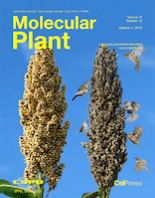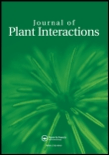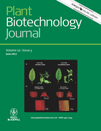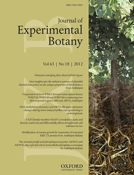
PLANTA
Scope & Guideline
Elevating botanical research to new heights.
Introduction
Aims and Scopes
- Plant Development and Physiology:
Research focusing on plant growth, development, and physiological processes, including studies on hormonal regulation, metabolic pathways, and responses to environmental stimuli. - Genetics and Genomics:
Exploration of genetic diversity, genomic mapping, and functional genomics to understand traits related to stress tolerance, disease resistance, and crop improvement. - Plant-Microbe Interactions:
Studies investigating the complex relationships between plants and microbial communities, including beneficial interactions with mycorrhizae and plant growth-promoting bacteria. - Biotechnology and Genetic Engineering:
Innovative approaches in plant biotechnology, including CRISPR/Cas9 applications, transgenic plants, and genetic modification techniques aimed at enhancing crop resilience and productivity. - Ecophysiology and Environmental Stress:
Research examining how plants adapt to abiotic stresses such as drought, salinity, and temperature fluctuations, including physiological, biochemical, and molecular mechanisms. - Secondary Metabolite Biosynthesis:
Studies on the biosynthesis and regulatory mechanisms of secondary metabolites, which play crucial roles in plant defense and human health. - Agricultural Practices and Crop Improvement:
Applied research aimed at improving agricultural practices and developing crop varieties with enhanced nutritional quality, yield, and resilience to environmental challenges.
Trending and Emerging
- Climate Resilience and Adaptation Strategies:
Research focused on understanding and enhancing plant resilience to climate change impacts, including drought tolerance, heat resistance, and adaptive traits, has gained significant traction. - Molecular Mechanisms of Plant Stress Responses:
Increasing interest in the molecular and genetic basis of plant responses to abiotic and biotic stresses, including detailed studies on signaling pathways and gene expression profiles. - Plant-based Solutions for Food Security:
A growing emphasis on the role of plants in addressing global food security challenges, including research on underutilized crops and biofortification strategies. - Sustainable Agricultural Practices:
Emerging studies that integrate plant sciences with sustainable agricultural practices, focusing on reducing chemical inputs and enhancing ecosystem services through biodiversity. - Functional Genomics and Metagenomics:
The application of functional genomics and metagenomics to explore plant-microbe interactions and the microbiome's role in plant health and productivity is increasingly prominent. - Synthetic Biology in Plant Research:
Innovative approaches in synthetic biology to engineer plants for enhanced traits and functions are becoming more frequent, reflecting the intersection of technology and plant science.
Declining or Waning
- Traditional Breeding Approaches:
Research related to conventional plant breeding techniques has seen a decline as advancements in genomic and biotechnological methods take precedence, emphasizing modern breeding techniques over traditional methods. - Basic Ecological Studies:
There appears to be a reduction in purely observational ecological studies that do not incorporate molecular or genetic analyses, as the focus shifts towards more integrative, mechanistic approaches. - Invasive Species Management:
While still important, the volume of research specifically targeting invasive species management strategies has decreased, possibly due to a greater emphasis on broader ecological and conservation topics. - Plant Pathology without Genetic Insights:
Studies on plant pathogens that do not incorporate genetic or molecular insights are waning, as the field increasingly values interdisciplinary approaches that combine molecular biology with pathology. - Plant Morphology Studies:
Research focusing solely on morphological descriptions and classifications of plants has declined, as there is a growing preference for studies that link morphology to molecular and genetic factors.
Similar Journals

Frontiers in Plant Science
Fostering breakthroughs in plant physiology and ecology.Frontiers in Plant Science is a premier open-access journal dedicated to advancing the understanding of plant biology, covering a broad spectrum of topics including physiology, ecology, and biotechnology. Published by FRONTIERS MEDIA SA in Switzerland, this journal has established itself as a key resource in the field of plant science, boasting an impressive impact factor and ranking in the Q1 category for plant science as of 2023. With its Scopus rank of 61 out of 516 in both Agricultural and Biological Sciences, the journal is recognized for its quality and relevance, being in the 88th percentile among its peers. Since its inception in 2010, Frontiers in Plant Science has embraced an open-access format, ensuring that cutting-edge research is readily available to scientists, professionals, and educators around the globe. The journal aims to foster innovative research and collaboration within the plant science community, making it an essential publication for those looking to stay at the forefront of the discipline.

Czech Journal of Genetics and Plant Breeding
Fostering collaboration in genetics and plant breeding.Czech Journal of Genetics and Plant Breeding is a premier academic journal dedicated to advancing the fields of genetics and plant science. Published by the esteemed Czech Academy Agricultural Sciences, this journal has been available as an Open Access resource since 2002, ensuring that essential research is freely accessible to a global audience. With an ISSN of 1212-1975 and an E-ISSN of 1805-9325, it continues to disseminate high-quality studies and findings from the vibrant scientific community in the Czech Republic and beyond. The journal operates within the Scopus ranks, securing 279th place in the category of Plant Science and 282nd in Genetics, reflecting its commitment to scholarly rigor. The Journal's objectives focus on exploring innovations in genetic research and plant breeding methodologies, offering valuable insights that foster collaboration among researchers, professionals, and students alike. As the journal converges from 2007 to 2024, it remains a vital publication for those seeking to stay abreast of developments in genetic diversity, crop improvement, and sustainable agriculture practices.

Molecular Plant
Fostering collaboration for a greener tomorrow.Molecular Plant, published by CELL PRESS, is a premier journal dedicated to advancing the field of molecular biology and plant science. With an impressive impact factor reflecting its rigorous peer-review process and the high quality of its published research, this journal has achieved a remarkable Q1 ranking in both Molecular Biology and Plant Science categories as of 2023. Its Scopus rankings place it within the top echelons of its field, holding 2nd place in Agricultural and Biological Sciences - Plant Science, showcasing its vital role in disseminating impactful research. The journal covers a broad range of topics, including but not limited to, plant genetics, molecular interactions, and biotechnological advances. Research published in Molecular Plant has the potential to significantly influence agricultural practices and biotechnological applications, making it an essential resource for researchers, professionals, and students eager to stay at the forefront of plant research. Access options for the journal are tailored to accommodate a wide audience, facilitating engagement with cutting-edge findings and breakthroughs. As the field of plant science continues to evolve, Molecular Plant remains integral to fostering innovation and collaboration within the scientific community.

Journal of Plant Interactions
Unveiling the Secrets of Plant InteractionsThe Journal of Plant Interactions, published by Taylor & Francis Ltd in the United Kingdom, serves as a leading open-access platform dedicated to advancing the understanding of plant interactions and their ecological implications. Established in 2005 and transitioning to open access in 2015, this journal focuses on both fundamental and applied aspects of plant interactions, providing invaluable insights for researchers, professionals, and students within the fields of Ecology and Plant Science. With a commendable impact factor and ranked in the second quartile (Q2) for both Ecology, Evolution, Behavior and Systematics and Plant Science, it reflects the quality and relevance of its published research. Researchers aiming to publish innovative studies on plant behavior and ecosystem dynamics will find a welcoming avenue for their work, as the journal is dedicated to fostering open dialogue and sharing knowledge across disciplines.

PLANT BIOTECHNOLOGY JOURNAL
Catalyzing breakthroughs in agricultural biotechnology.Plant Biotechnology Journal, published by Wiley, is a premier open-access platform dedicated to advancing the field of plant biotechnology. Since its inception in 2003, this journal has played a pivotal role in disseminating high-quality research that enhances our understanding of plant genomics, biochemistry, and molecular biology. With an impressive impact factor and a prominent position in Q1 quartiles across Agronomy, Crop Science, Biotechnology, and Plant Science, it ranks among the top journals globally, reflecting its significant influence in the agricultural and biological sciences. Researchers and professionals can access cutting-edge studies and reviews that facilitate innovation in sustainable crop production and biotechnology applications. The journal's transition to an open access model since 2016 has further amplified its reach, ensuring that vital research is available to a global audience, promoting collaboration and knowledge sharing within the scientific community.

Tropical Plant Biology
Unveiling the Secrets of Tropical Plant LifeTropical Plant Biology is a premier academic journal published by Springer, dedicated to advancing the understanding of tropical plants and their ecological significance. With an ISSN of 1935-9756 and an E-ISSN of 1935-9764, this journal serves as a vital platform for researchers, professionals, and students focused on the fields of Genetics and Plant Science. Notably recognized in 2023 as a Q2 journal in Plant Science and Q3 in Genetics, it ranks 171st out of 516 in Agricultural and Biological Sciences and 227th out of 347 in Genetics according to Scopus. The journal encompasses a diverse range of topics, offering insights into tropical plant biology, ecology, conservation, and biodiversity. Although it does not currently operate under an open-access model, it remains an essential resource for anyone passionate about tropical ecosystems and their intricate relationships. With contributions spanning from 2009 to 2024, Tropical Plant Biology continues to foster scholarly discourse and innovation in the field.

Molecular Horticulture
Pioneering Discoveries in Sustainable Horticultural PracticesMolecular Horticulture is a prestigious journal published by SpringerNature, dedicated to advancing knowledge in the fields of Agronomy, Crop Science, Horticulture, and Molecular Biology. Based in the United Kingdom, this journal, with ISSN 2730-9401, is recognized for its high-quality, peer-reviewed research and has rapidly established itself within the academic community, achieving a remarkable Q1 ranking across its relevant categories as of 2023. With a strong focus on innovative research that explores the intersection of molecular biology and horticultural science, Molecular Horticulture provides valuable insights that are essential for researchers and professionals aiming to enhance crop production and sustainability practices. As part of the Scopus database, the journal ranks impressively within its fields, holding notable positions such as Rank #7 in Horticulture and Rank #42 in Agronomy and Crop Science. While currently published through traditional access models, the journal remains accessible to a wide audience of scientists, educators, and students eager to stay informed on the latest discoveries and trends in plant science.

Rice
Pioneering research at the intersection of agriculture and science.Rice, an esteemed journal published by Springer, is at the forefront of scientific research in the fields of Agronomy, Plant Science, and Soil Science. With its ISSN 1939-8425 and E-ISSN 1939-8433, the journal offers open access since 2012, ensuring that vital research findings are widely accessible to researchers, professionals, and students globally. Based in the United States, the journal has established itself as a pivotal resource, reflected in its impressive rankings—Q1 across multiple categories in 2023, including Agronomy, Plant Science, and Soil Science. With Scopus rankings positioning it in the top tiers of agricultural and biological sciences, Rice continues to foster innovative dialogue and advances in agricultural research. The journal's objectives focus on disseminating high-quality research that contributes significantly to the understanding and sustainable management of rice production, supporting global food security and agricultural practices. Researchers in this domain will find Rice to be an invaluable resource for cutting-edge findings and collaborative opportunities.

JOURNAL OF EXPERIMENTAL BOTANY
Transforming our understanding of botanical science.JOURNAL OF EXPERIMENTAL BOTANY, published by Oxford University Press, stands as a premier journal for researchers and professionals in the fields of plant science and physiology. With an illustrious history dating back to 1950, this journal has established itself as a critical resource for advancing our understanding of plant biology and its applications. It is recognized in the top tier of academic publishing, reflected in its Q1 rankings in both Plant Science and Physiology for 2023, and boasts impressive Scopus rankings—placing it in the 96th and 91st percentiles of its respective categories. Though not an open-access journal, it ensures widespread access to groundbreaking research aimed at unraveling the complexities of plant functions and adaptations. As we look toward 2024, the JOURNAL OF EXPERIMENTAL BOTANY continues to play an essential role in fostering innovation, collaboration, and education within this vital area of science.

MOLECULAR BREEDING
Advancing Sustainable Agriculture Through Molecular InnovationMOLECULAR BREEDING is a prestigious journal published by Springer, dedicated to advancing the field of agronomy, plant science, and biotechnology through innovative research contributions. With an impressive ISSN of 1380-3743 and E-ISSN 1572-9788, this journal has continuously served the scientific community since its inception in 1995. Operating from the Netherlands, MOLECULAR BREEDING is recognized for its high impact factor and status in the Q1 quartile for both Agronomy and Crop Science and Plant Science in the latest 2023 metrics, highlighting its influential role in these domains. With strong Scopus rankings reflecting its position within the top percentiles of various related fields—including a notable 81st percentile in Plant Science—this journal is essential for researchers, professionals, and students striving to understand and innovate in molecular genetics and breeding techniques. Although it does not provide open access, its rigorous peer-review process ensures that published articles maintain the highest standards and contribute significantly to the scientific discourse. The journal’s diverse scope encompasses significant advancements in molecular biology and genetics, ultimately supporting the global objectives of sustainable agriculture and enhanced crop resilience.